unit10知识点讲解
九年级 unit10 知识要点

unit10一、语法be supposed/expected to do sth.=should do sth二、知识点1.shake hands 2.for the first time 3.greet sb.(in) the wrong way 4.happen to sb.5.as soon as6.with my hand out7.hold out sb’s hand8.to one’s surprise9.find out 10.drop by 11.as…as sb.can=as…as possible 12.make an effort to do sth.=try to do sth.13.aviod doing sth. 14.keep sb. doing sth. 15.make plans to do sth.=plan to do sth. 16.go abroad 17.stick …into18.point at sb.19.go out of one’s way to do sth20.make sb.feel at home21.be comfortabl e doing sth22.imagine (sb’s) doing sth 23.except与besides 24.at home25.have a good year三、句子1.Where I’m from ,we’re pretty relaxed about time.2.There is no reason to be late.3.We value the time we spend with our family and friends in our everyday lives.4.We often just walk around the town center, seeing as many of our friends as we can.unit10一、语法be supposed/expected to do sth.=should do sth二、知识点1.shake hands 2.for the first time 3.greet sb.(in) the wrong way 4.happen to sb.5.as soon as6.with my hand out7.hold out sb’s hand8.to one’s surprise9.find out 10.drop by 11.as…as sb.can=as…as possible 12.make an effort to do sth.=try to do sth.13.aviod doing sth. 14.keep sb. doing sth. 15.make plans to do sth.=plan to do sth. 16.go abroad 17.stick …into18.point at sb.19.go out of one’s way to do sth20.make sb.feel at home21.be comfortable doing sth22.imagine (sb’s) doing sth 23.except与besides 24.at home25.have a good year三、句子1.Where I’m from ,we’re pretty relaxed about time.2.There is no reason to be late.3.We value the time we spend with our family and friends in our everyday lives.4.We often just walk around the town center, seeing as many of our friends as we can.unit10一、语法be supposed/expected to do sth.=should do sth二、知识点1.shake hands 2.for the first time 3.greet sb.(in) the wrong way 4.happen to sb.5.as soon as6.with my hand out7.hold out sb’s hand8.to one’s surprise9.find out 10.drop by 11.as…as sb.can=as…as possible 12.make an effort to do sth.=try to do sth.13.aviod doing sth. 14.keep sb. doing sth. 15.make plans to do sth.=plan to do sth. 16.go abroad 17.stick …into18.point at sb.19.go out of one’s way to do sth20.make sb.feel at home21.be comfortable doing sth22.imagine (sb’s) doing sth 23.except与besides 24.at home25.have a good year三、句子1.Where I’m from ,we’re pretty relaxed about time.2.There is no reason to be late.3.We value the time we spend with our family and friends in our everyday lives.4.We often just walk around the town center, seeing as many of our friends as we can.unit10一、语法be supposed/expected to do sth.=should do sth二、知识点1.shake hands 2.for the first time 3.greet sb.(in) the wrong way 4.happen to sb.5.as soon as6.with my hand out7.hol d out sb’s hand8.to one’s surprise9.find out 10.drop by 11.as…as sb.can=as…as possible 12.make an effort to do sth.=try to do sth.13.aviod doing sth. 14.keep sb. doing sth. 15.make plans to do sth.=plan to do sth. 16.go abroad 17.stick …into18.point at sb.19.go out of one’s way to do sth20.make sb.feel at home21.be comfortable doing sth22.imagine (sb’s) doing sth 23.except与besides 24.at home25.have a good year三、句子1.Where I’m from ,we’re pretty relaxed about time.2.There is no reason to be late.3.We value the time we spend with our family and friends in our everyday lives.4.We often just walk around the town center, seeing as many of our friends as we can.unit10一、语法:应该干某事二、知识点1.握手2.第一次3.用错误的方式问候某人 4.发生在某人身上5.一…就6伸着我的手7.伸出某人的手8.令某人惊奇的是9.发现(经努力).10顺便拜访11.尽可能12.努力干某事13.避免干某事14.一直干某事15.计划干某事16.出国17.将…刺入18.指着某人.19.特地干某事20.使某人感到宾至如归1.自如的干某事22.想象(某人)干某事23.除…之外无/除…之外还有24.在家里/在国内25.一个学年过得愉快三、句子1.我来的地方,我们对于时间是相当宽松的.2.没理由迟到3.我们重视在我们的日常生活中和我们的家人和朋友一起度过的时光4.我们恰恰绕着市中心散步,会见我们尽可能多的朋友.unit10一、语法:应该干某事二、知识点1.握手2.第一次3.用错误的方式问候某人 4.发生在某人身上5.一…就6伸着我的手7.伸出某人的手8.令某人惊奇的是9.发现(经努力).10顺便拜访11.尽可能12.努力干某事13.避免干某事14.一直干某事15.计划干某事16.出国17.将…刺入18.指着某人.19.特地干某事20.使某人感到宾至如归1.自如的干某事22.想象(某人)干某事23.除…之外无/除…之外还有24.在家里/在国内25.一个学年过得愉快三、句子1.我来的地方,我们对于时间是相当宽松的.2.没理由迟到3.我们重视在我们的日常生活中和我们的家人和朋友一起度过的时光4.我们恰恰绕着市中心散步,会见我们尽可能多的朋友.unit10一、语法:应该干某事二、知识点1.握手2.第一次3.用错误的方式问候某人 4.发生在某人身上5.一…就6伸着我的手7.伸出某人的手8.令某人惊奇的是9.发现(经努力).10顺便拜访11.尽可能12.努力干某事13.避免干某事14.一直干某事15.计划干某事16.出国17.将…刺入18.指着某人.19.特地干某事20.使某人感到宾至如归1.自如的干某事22.想象(某人)干某事23.除…之外无/除…之外还有24.在家里/在国内25.一个学年过得愉快三、句子1.我来的地方,我们对于时间是相当宽松的.2.没理由迟到3.我们重视在我们的日常生活中和我们的家人和朋友一起度过的时光4.我们恰恰绕着市中心散步,会见我们尽可能多的朋友.unit10一、语法:应该干某事二、知识点1.握手2.第一次3.用错误的方式问候某人 4.发生在某人身上5.一…就6伸着我的手7.伸出某人的手8.令某人惊奇的是9.发现(经努力).10顺便拜访11.尽可能12.努力干某事13.避免干某事14.一直干某事15.计划干某事16.出国17.将…刺入18.指着某人.19.特地干某事20.使某人感到宾至如归1.自如的干某事22.想象(某人)干某事23.除…之外无/除…之外还有24.在家里/在国内25.一个学年过得愉快三、句子1.我来的地方,我们对于时间是相当宽松的.2.没理由迟到3.我们重视在我们的日常生活中和我们的家人和朋友一起度过的时光4.我们恰恰绕着市中心散步,会见我们尽可能多的朋友.。
人教版八年级英语上册Unit10知识点精讲
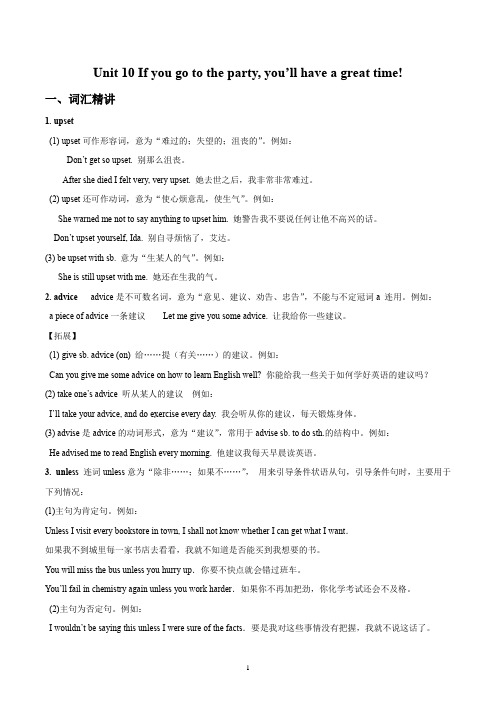
Unit 10 If you go to the party, you’ll have a great time!一、词汇精讲1. upset(1) upset可作形容词,意为“难过的;失望的;沮丧的”。
例如:Don’t get so upset. 别那么沮丧。
After she died I felt very, very upset. 她去世之后,我非常非常难过。
(2) upset还可作动词,意为“使心烦意乱,使生气”。
例如:She warned me not to say anything to upset him. 她警告我不要说任何让他不高兴的话。
Don’t upset yourself, Ida. 别自寻烦恼了,艾达。
(3) be upset with sb. 意为“生某人的气”。
例如:She is still upset with me. 她还在生我的气。
2. advice advice是不可数名词,意为“意见、建议、劝告、忠告”,不能与不定冠词a 连用。
例如:a piece of advice一条建议Let me give you some advice. 让我给你一些建议。
【拓展】(1) give sb. advice (on) 给……提(有关……)的建议。
例如:Can you give me some advice on how to learn English well? 你能给我一些关于如何学好英语的建议吗?(2) take one’s advice 听从某人的建议例如:I’ll take your advice, and do exercise every day. 我会听从你的建议,每天锻炼身体。
(3) advise是advice的动词形式,意为“建议”,常用于advise sb. to do sth.的结构中。
例如:He advised me to read English every morning. 他建议我每天早晨读英语。
九年级英语上册unit10知识要点
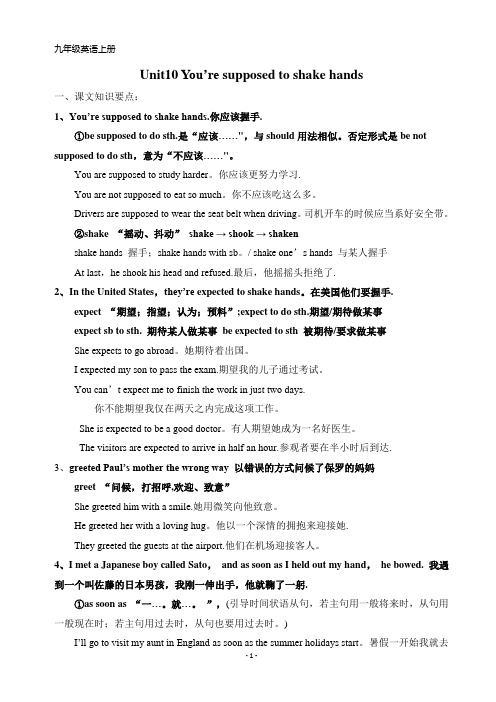
九年级英语上册Unit10 You’re supposed to shake hands一、课文知识要点:1、You’re supposed to shake hands.你应该握手.①be supposed to do sth.是“应该……",与should用法相似。
否定形式是be not supposed to do sth,意为“不应该……"。
You are supposed to study harder。
你应该更努力学习.You are not supposed to eat so much。
你不应该吃这么多。
Drivers are supposed to wear the seat belt when driving。
司机开车的时候应当系好安全带。
②shake “摇动、抖动”shake → shook → shakenshake hands 握手;shake hands with sb。
/ shake one’s hands 与某人握手At last,he shook his head and refused.最后,他摇摇头拒绝了.2、In the United States,they’re expected to shake hands。
在美国他们要握手.expect “期望;指望;认为;预料”;expect to do sth.期望/期待做某事expect sb to sth. 期待某人做某事be expected to sth 被期待/要求做某事She expects to go abroad。
她期待着出国。
I expected my son to pass the exam.期望我的儿子通过考试。
You can’t expect me to finish the work in just two days.你不能期望我仅在两天之内完成这项工作。
She is expected to be a good doctor。
unit 10知识点
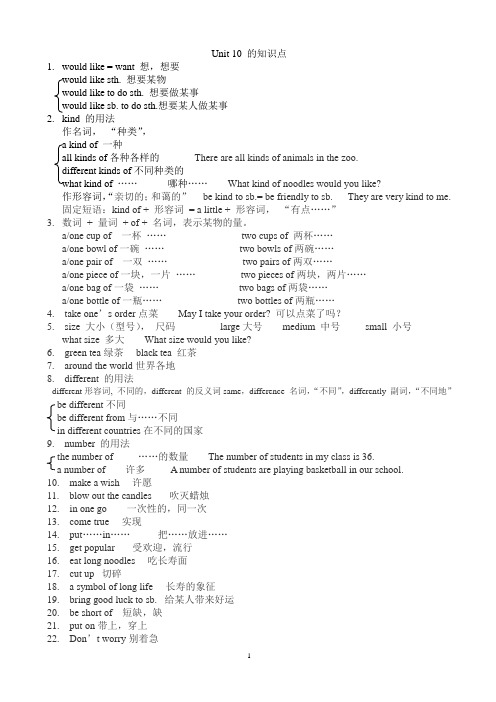
Unit 10 的知识点1.would like = want 想,想要would like sth. 想要某物would like to do sth. 想要做某事would like sb. to do sth.想要某人做某事2.kind 的用法作名词,“种类”,重点句型1.--What would you like ? --I’m not sure yet.yet: 还,仍然。
主要用于否定句和疑问句中。
2. Are there any vegetables in the beef noodles?any: 一些。
用于否定句和疑问句中。
some: 一些。
用于肯定句中。
3. May I take your order? (请问)您可以点菜了吗?4. What kind of noodles would you like? 你想要什么样的面条?What kind of …… ? 用来询问种类,of 后可以接复数名词,也可以接不可数名词。
例: What kind of music do you like?5. Would you like a large bowl?Would you like ……? 你愿意……吗?用于向对方有礼貌的提出建议和请求。
肯定回答:Yes, I’d like to. / Yes , I’d love to.否定回答:No, thanks . / Sorry ,+ 拒绝的理由。
6. What size would you like ? 你想要多大碗的?What size ……? 用来询问大小,尺寸,尺码,意思是: 多大尺寸……?常用 large, medium, small来回答。
例:What size shirt do you want? I want size 36.7. All of these birthday foods may be different.may be :可能是,也许是例: I may be a little late.8. They bring good luck to the birthday person.bring: 带来,拿来。
Unit10 知识要点解析
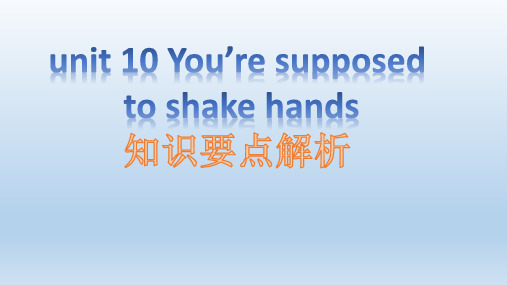
• be worth doing sth 值得做某事,句子主语一般事或物,是do的宾语 • be worth +钱 “值多少钱” • be worth +名词 “值得” • well worth ‘很值得’,不能说 very worth • 【练一练】
_________(握手)with them. • ②当第一次见朋友是,你们应该握手。 • You’re ________ to shake ______ (hand) when you meet your
friends.
3.In the United States, they’re expected to shake hands. 在美国,他们应该握手。
11.If there are people in the meeting room , you are supposed to knock before entering .
• knock v. 敲(门等), 碰撞 • knock at/on the door 敲门 knock into 与......相撞 knock down 撞倒 • 【练一练】用介词at/on,into,down填空 • 1)He knocked ______ the door , but no one answered. • 2)The car knocked ________ the tree last night and the driver hurt. • 3)The boy was knocked ________ by a running bike on the street.
tired.
人教版九年级全一册英语Unit10重点语法知识点总结
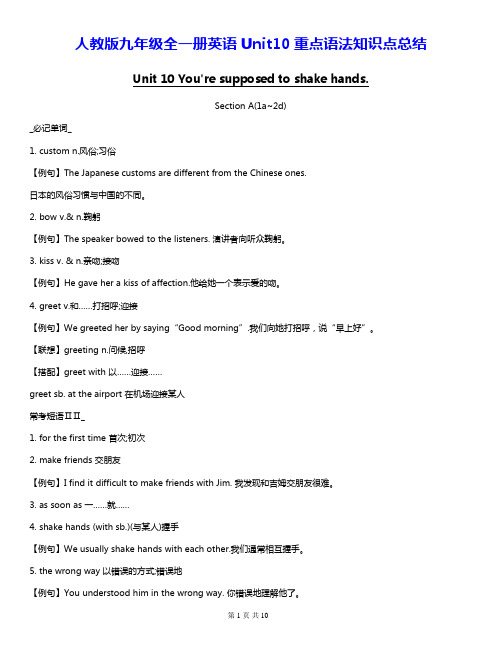
人教版九年级全一册英语Unit10重点语法知识点总结Unit 10 You're supposed to shake hands.Section A(1a~2d)_必记单词_1. custom n.风俗;习俗【例句】The Japanese customs are different from the Chinese ones.日本的风俗习惯与中国的不同。
2. bow v.& n.鞠躬【例句】The speaker bowed to the listeners. 演讲者向听众鞠躬。
3. kiss v. & n.亲吻;接吻【例句】He gave her a kiss of affection.他给她一个表示爱的吻。
4. greet v.和……打招呼;迎接【例句】We greeted her by saying“Good morning”.我们向她打招呼,说“早上好”。
【联想】greeting n.问候,招呼【搭配】greet with 以……迎接……greet sb. at the airport 在机场迎接某人常考短语ⅡⅡ_1. for the first time 首次;初次2. make friends 交朋友【例句】I find it difficult to make friends with Jim. 我发现和吉姆交朋友很难。
3. as soon as 一……就……4. shake hands (with sb.)(与某人)握手【例句】We usually shake hands with each other.我们通常相互握手。
5. the wrong way 以错误的方式;错误地【例句】You understood him in the wrong way. 你错误地理解他了。
6. hold out 伸出(手等)7. greet each other 互相问候8. to one’s surprise 令某人惊讶的是经典句型ⅢⅡ1. That's how people in Japan are expected to greet each other.那就是在日本人们互相问候的方式。
Unit10_I'd_like_some_noodles_知识点

I’d like some noodles一.重点词汇1.可数noodles:面条potatoes:土豆tomatoes:西红柿vegetables:蔬菜carrots:胡萝卜onions:洋葱dumplings:饺子pancakes:薄饼2.不可数mutton:羊肉beef:牛肉meat:肉porridge:稀饭Soup:汤milk:牛奶Water:水3.有时可数有时不可数chicken:鸡肉cabbage:卷心菜fish:鱼二.重点短语would like:愿意,喜欢a large bowl of :一大碗two bowls of :两碗what kind of :哪种?Blow out:吹灭Make a wish:许愿Bring good luck to : 给。
带来好运Cut up:切get popular:受欢迎三.重点句型1.-- What would you like?-- I'd like beef noodles, please.2.--What kind of noodles would you like?-- I'd like the beef noodles, please.3.May I take your order? 我能拿走你的菜单吗?4.--What size would you like? 你想要多大的?--I’d like a large bowl, please.5.--Is there any meet in the tomato and egg soup?No, there isn’t any.四.重点知识1、Would like的用法2.1 would like 意为想要,愿意,相当于want,用于提出要求或建议;但语气比want委婉,一般有一下三种形式:①would like sth. 想要某物后接名词不加to如:我想要些冰淇淋I would like some ice cream.②would like to do sth. 想要干某事后跟动词,加to如:我想要和你一起去。
人教版英语八年级unit10知识点全解
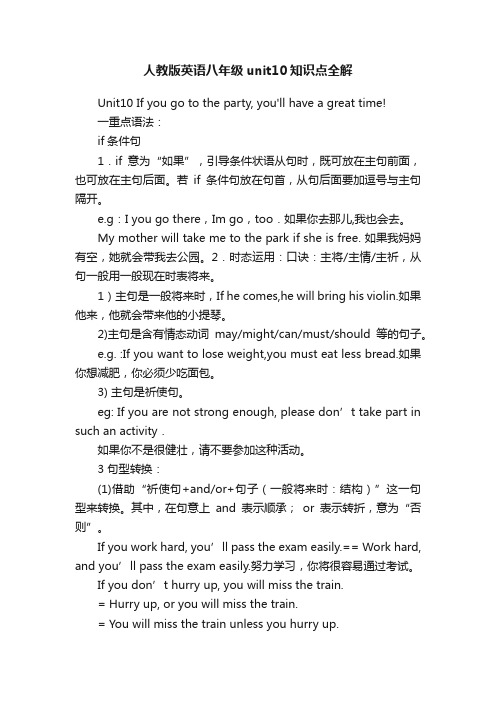
人教版英语八年级unit10知识点全解Unit10 If you go to the party, you'll have a great time!一重点语法:if条件句1.if意为“如果”,引导条件状语从句时,既可放在主句前面,也可放在主句后面。
若if条件句放在句首,从句后面要加逗号与主句隔开。
e.g:I you go there,Im go,too.如果你去那儿,我也会去。
My mother will take me to the park if she is free. 如果我妈妈有空,她就会带我去公园。
2.时态运用:口诀:主将/主情/主祈,从句一般用一般现在时表将来。
1)主句是一般将来时,If he comes,he will bring his violin.如果他来,他就会带来他的小提琴。
2)主句是含有情态动词may/might/can/must/should等的句子。
e.g. :If you want to lose weight,you must eat less bread.如果你想减肥,你必须少吃面包。
3) 主句是祈使句。
eg: If you are not strong enough, please don’t take part in such an activity.如果你不是很健壮,请不要参加这种活动。
3 句型转换:(1)借助“祈使句+and/or+句子(一般将来时:结构)”这一句型来转换。
其中,在句意上and表示顺承;or表示转折,意为“否则”。
If you work hard, you’ll pass the exam easily.== Work hard, and you’ll pass the exam easily.努力学习,你将很容易通过考试。
If you don’t hurry up, you will miss the train.= Hurry up, or you will miss the train.= You will miss the train unless you hurry up.如果你不快点,你会错过火车。
Unit10重点短语-知识点-作文句复习提纲2023-2024学年人教版九年级英语全册

九年级Unit 10 You are supposed to shake hands.一.重点短语用法1. be supposed to sth.应该做;被期望做某事=be excepted to do sth. ( except +that从句;except (sb.) to do sth.) = should do sth. 否定:be not supposed to sth. be not excepted to do sth. shouldn’t do sth.2.shake hands with sb.与某人握手(shook / shaken)3.kiss sb. on +身体部位 (give sb. a kiss)4.for the first time 首次;初次5.到达某地:arrive in+大地点arrive at+小地点;get to sp. (后面出现home/here/there时要省略介词);reach+地点(及物)6.arrive late = be late迟到7.in+年份/月份/季节(早中晚);on+具体到某一天(星期/日期/被修饰的早中晚); at+具体时间点8.invite sb. to do sth.邀请某人做某事 ; invite sb. to sp.邀请某人去某地 be .invited to do sth./ to sp.被邀请...invitation名词(accept an invitation接受邀请 turn down the invitation/ refuse the invitation拒绝邀请)9.make some careless mistakes犯一些粗心的错误 make fire生火 make sure确保make progress取得进步 make efforts努力10.greet sb. the wrong way以错误的方式问候某人11.wele party欢迎会12.make friends交朋友13.relaxed(adj.)放松的,修饰sb.→relaxing (adj.)令人放松的,修饰sth.→relax(v.)放松 be relaxed about sth./doing sth.对...比较随意14.happen偶然发生/ take place按计划发生(均无被动语态) happen to do sth.碰巧做某事 What happened to sb.?某人发生了什么?15.as soon as一.....就....(引导时间状语从句,“主将/情态动词/祈使句从现”;“主过从过” 16.hold out 伸出(held)20.to one’s surprise 令某人惊讶的是 in surprise 惊讶地be surprised to do“做某事感到惊讶”be surprised at“对…表示惊讶”21.find out弄清楚;查明白(强调过程不易) find找到;发现(强调结果) look for(强调过程)22.on both sides of my face 在我的双颊上get mad at/with sb. 生某人气=be angry with sb. ; get mad about sth. 对某事生气24.drop by 顺便访问 25.clean…off 把……擦掉 26.take off 脱下;起飞27.be (well) worth doing sth.值得做某事28.rush around东奔西跑 rush to do sth.匆忙做某事 in a rush匆忙地29.a little = a bit = kind of有点;稍微30.value(v./n.)价值→valuable(adj)有价值的31.make plans to do=plan to do计划做某事 32.on the side of在....的一边33.as.... as sb. can/could尽可能... as....as possible34.on time准时(上课开会) in time及时 (突发急救)35.the capital of...的首都 36.after all毕竟37.make an effort to do sth. 努力做某事=try/manage to do sth.=try one’s best to do sth.38.avoid doing sth. 避免做某事 avoid heavy traffic 避免交通拥堵39.keep sb. doing sth.让某人一直做某事keep sb.+adj.使某人保持...40.without doing sth.没有做某事 41.everyday 每日的/日常的=daily every day每一天 42.go abroad 出国43.It’s no big deal!=It’s not a big deal!没什么大不了44.value the time 珍惜时光 45.in our everyday lives 在我们的日常生活中social situations 社交场合/情景49.knock on/at the door敲门 knock into 与....相撞 50.be helpful to do sth.做某事有帮助 51. basic table manners 基本餐桌礼仪base52.mind your manners注意的举止/行为 53.stick…into… 把……插入……stickto doing坚持做某事 stick动词粘贴 stick n. 手杖;木棍54.hit an empty bowl敲击空碗 hit 3A型现在分词hitting55.start to do sth. / start doing sth.开始做某事56.point at指着 point to指向(有距离,较远的事物) point out 指出57.at the table在桌子旁 at table 吃饭58.the biggest challenge最大的挑战challenge oneself 挑战某人自己(动词)59.an exchange student一名交换生60.thanks for doing sth.因...而感谢 thanks to多亏,幸亏61.have a great time/ have fun (in)doing sth.=enjoy oneself62.get out of one’s way to do sth. 格外努力63.make sb. feel at home 使(某人)感到宾至如归64.get/be used to doing sth. 习惯做某事65.there is no reason (for sb.) to do sth.对某人来说没理由去做某事66.in French用法语 67.because+句子 because of+短语69.how to behave at the dinner table如何在餐桌表现 bahavior(n.) 行为,表现70.be different from与...不同 be the same as与...相同 be similar to与...相似71.imagine doing sth.想象做某事(常用于否定句)72. except (prep.)除...外(不包括,“—”) →besides(prep.)除...外(包括,“+”)73.look forward to doing sth. 盼望做某事74.suggestion(n.) →suggestions(pl.)→advice(n.)建议give sb. Some suggestions/advice ; advise sb. to do sth. suggest doing sth.75.eastern(adj.)东方的→east(n./adv.)东方/向东northern(adj.)北方的→north(n.) 北方 south南方southern west西方western76.show up 出现;出席 77..look forward to doing sth. 盼望做某事 78. You wouldn’t believe …常用句式,“你无法想象……;79. behave oneself意为“表现得体;有礼貌”83.talk to sb. talk with sb. talk about sth. 84.take notes记笔记85. avoid doing sth.避免做某事 86.go abroad 出国二、重点易混淆语法点:句型“It’s + adj.+ to do sth.”,意为“做某事是……的”。
九年级u10知识点
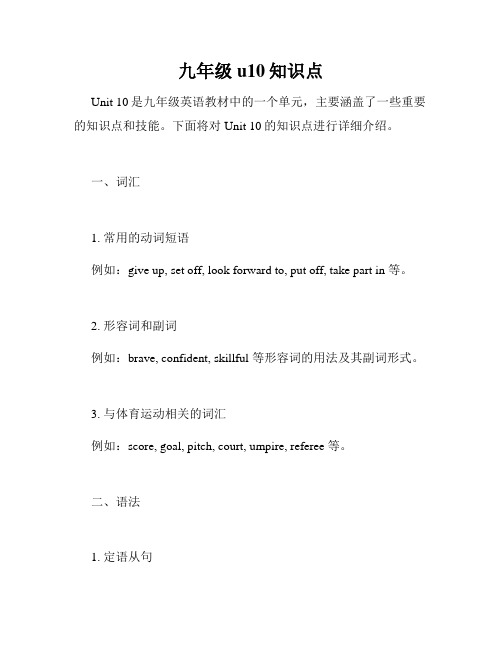
九年级u10知识点Unit 10是九年级英语教材中的一个单元,主要涵盖了一些重要的知识点和技能。
下面将对Unit 10的知识点进行详细介绍。
一、词汇1. 常用的动词短语例如:give up, set off, look forward to, put off, take part in 等。
2. 形容词和副词例如:brave, confident, skillful 等形容词的用法及其副词形式。
3. 与体育运动相关的词汇例如:score, goal, pitch, court, umpire, referee 等。
二、语法1. 定语从句定语从句是一个非常重要的语法结构,它可以修饰名词,并且在句中起到进一步限制或说明的作用。
在定语从句中,我们需要学会选择适当的关系代词或关系副词,并了解其用法。
2. 状语从句状语从句是一个从句,用来修饰句子中的动词、形容词或副词,来表达时间、条件、原因、目的、方式等各种状况。
在学习状语从句时,需了解不同类型的状语从句的使用方法。
3. 被动语态被动语态是英语中常用的一种语态,通过被动语态可以更准确地表达一个动作或事件的发生。
在学习被动语态时,需要掌握其构成、变换方式以及适当的使用场景。
三、阅读理解Unit 10中的阅读理解部分包含了一些关于体育运动、运动员以及运动故事的文章。
学生需要仔细阅读并回答问题,培养他们的阅读理解能力。
四、写作技巧Unit 10中的写作技巧部分主要培养学生撰写与体育相关的文章的能力。
学生需要学会如何运用所学词汇和语法知识,以及如何组织内容,写出连贯、准确的英语短文。
五、口语交际在Unit 10中,学生将通过各种情境对话来进行口语交际。
通过模仿和角色扮演的方式,提高学生的口语表达能力,并培养他们在实际交际中使用所学知识的能力。
六、听力训练Unit 10中的听力训练部分旨在让学生提高听力理解能力。
学生将聆听各种对话和短文,然后完成相关的练习,以检验他们对所听内容的理解程度。
2022年Unit10-If-you-go-to-the-party知识点归纳

Unit10 If you go to the party, you’ll have a great time!知识点归纳一、if 引导旳条件状语从句【考例】If____, I will go. A. he doesn’t come B. he won’t come C. he will come D. he is comingif 引导旳条件状语从句。
If是连词,所连接旳句子叫条件状语从句,表达假设或条件,意思是“假如…旳话”,使用办法如下:1、表达假设,表达将会发生和也许发生旳事,或进行提醒警告。
if条件句:条件句用于陈说语气,表达假设旳状况也许发生,其中if 是“假如”旳意思。
使用办法:(1)条件状语从句一般由连词if引导,意为“假如、假如”,主句不能用be going to表达未来,而应当用shall,will如:If you go to the party, you will meet Uncle Zhang.I’ll as k the teacher for help if I don’t understand. (2)if “假如”,引导条件状语从句,主句用一般未来时,从句则用一般目前时。
如:If it rains tomorrow, we won’t go there. 假如明天下雨,我们就不去那了。
(3)若主句是祈使句,if引导旳条件状语从句仍用____________时态。
Put up your hand if you have any questions to ask.注意:宾语从句中旳if与条件状语从句if旳区别。
宾语从句中旳if“与否”相称于whether,引导宾语从句,时态需根据语境确定。
如:I don't know if it will rain tomorrow. 我不懂得明天与否会下雨。
2. 表达真实条件、客观真理、自然现象、定理定义、民间谚语等,句型是:If + 句子(一般目前时),+ 主句(一般目前时). 例:If you study hard ,you are sure to succeed . If you put ice in a warm place ,it turns into water .针对练习:( )1There is going to ______a soccer match next Sunday. If it ___, we’ll have to cancel(取消) it. a. be; will rain b. have; will rain c. be; rains d. have; rains( )2.If she ___harder, she will catch up with us soon. a. study b. studies c. will study d. studied( )3.I don’t know if he __________ to the party. If he _________, I’ll tell you.a. comes; comesb. will come; will comec. comes; will comed. will come; comes( )4. If you don’t go to the party this Friday, ____.a. he will, toob. he won’t, eitherc. he does, tood. he doesn’t, either二、用所给动词旳合适形式填空1. We ____________ (not go) for a picnic if it rains this Sunday2. You may go swimming if you _____________ (finish) your homework.3. They’ll go hiking if it ____________ (not snow) tomorrow.4. Your mother ____________ (be) angry with y ou if you don’t do your homework.5. I want to know if he ___________ (come) to the party tomorrow evening6. Water park is a good place ___________ (have) fun.7. Half the students ____________ (come) from countryside.8. Half of her money ___________ (spend) on clothes.9.- ---I feel hungry. ----why not ___________ (have) dinner with us?10. If she ____________ (not take) a bus to school tomorrow, she ____________ (be) late二、be doing, be going to do和will 在表达未来时旳区别:1.will/shall+动词原形2、be going to do表达未来【注意】“be going to do”和”will/shall+动词原形”区别在于,前者表达事先考虑好旳意图,而后者则表达未经事先考虑旳意图。
九年级英语Unit10 课文重难点知识点详细讲解
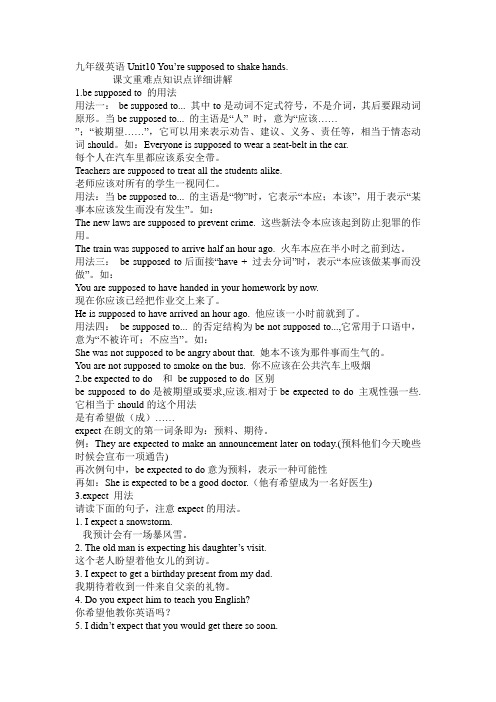
九年级英语Unit10 You‟re supposed to shake hands.课文重难点知识点详细讲解1.be supposed to 的用法用法一:be supposed to... 其中to是动词不定式符号,不是介词,其后要跟动词原形。
当be supposed to... 的主语是“人” 时,意为“应该……”;“被期望……”,它可以用来表示劝告、建议、义务、责任等,相当于情态动词should。
如:Everyone is supposed to wear a seat-belt in the car.每个人在汽车里都应该系安全带。
Teachers are supposed to treat all the students alike.老师应该对所有的学生一视同仁。
用法:当be supposed to... 的主语是“物”时,它表示“本应;本该”,用于表示“某事本应该发生而没有发生”。
如:The new laws are supposed to prevent crime. 这些新法令本应该起到防止犯罪的作用。
The train was supposed to arrive half an hour ago. 火车本应在半小时之前到达。
用法三:be supposed to后面接“have + 过去分词”时,表示“本应该做某事而没做”。
如:You are supposed to have handed in your homework by now.现在你应该已经把作业交上来了。
He is supposed to have arrived an hour ago. 他应该一小时前就到了。
用法四:be supposed to... 的否定结构为be not supposed to...,它常用于口语中,意为“不被许可;不应当”。
如:She was not supposed to be angry about that. 她本不该为那件事而生气的。
初中英语九年级unit10知识点
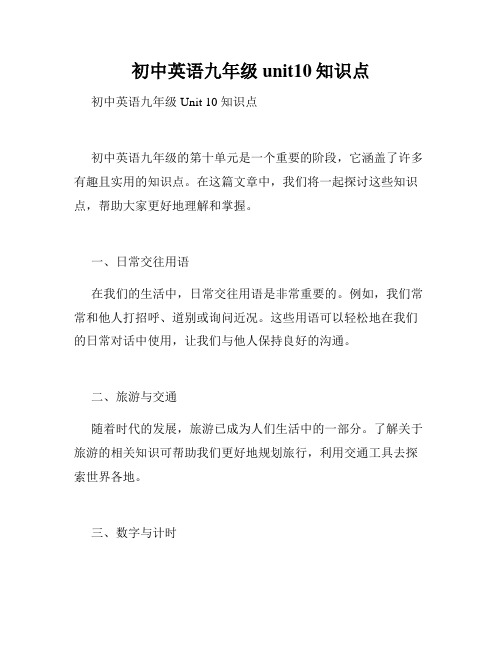
初中英语九年级unit10知识点初中英语九年级 Unit 10 知识点初中英语九年级的第十单元是一个重要的阶段,它涵盖了许多有趣且实用的知识点。
在这篇文章中,我们将一起探讨这些知识点,帮助大家更好地理解和掌握。
一、日常交往用语在我们的生活中,日常交往用语是非常重要的。
例如,我们常常和他人打招呼、道别或询问近况。
这些用语可以轻松地在我们的日常对话中使用,让我们与他人保持良好的沟通。
二、旅游与交通随着时代的发展,旅游已成为人们生活中的一部分。
了解关于旅游的相关知识可帮助我们更好地规划旅行,利用交通工具去探索世界各地。
三、数字与计时数字和计时在我们的日常生活中起着重要的作用。
无论是购物时计算价格,还是约定时间见面,我们都需要掌握数字和计时的基本知识。
四、描述人物和事物学习英语的一个关键目标是能够描述人物和事物。
通过丰富的词汇和表达方式,我们可以更清晰地向他人展示自己所见所闻。
五、健康与环境健康和环境是人们关注的重点话题。
了解如何保持健康和保护环境,不仅有益于我们自身,也有利于整个社会和地球的可持续发展。
六、情感表达与意愿人类是情感动物,我们的情感需要通过语言来表达。
学习如何正确地表达情感,以及表达意愿,能帮助我们更好地与他人交流和理解。
七、文化与艺术了解不同国家和地区的文化和艺术对我们拓宽视野、提升内涵有着重要的作用。
通过学习各个国家和地区的文化和艺术,我们不仅可以理解他们的思想观念,还可以丰富自己的人生经验。
八、阅读与写作技巧阅读和写作是我们学习和表达自己的重要工具。
学习阅读和写作技巧,可以帮助我们更好地理解文章,逐步提高自己的语言表达能力。
九、语法知识点语法是学习英语的重要基石。
掌握一些基本的语法知识和规则,能够更准确地运用语言,避免一些典型的语法错误。
十、听力技巧听力是学习英语的重要一环。
通过提高听力技巧,我们可以更好地理解听力材料,提高自己的听力水平。
以上是初中英语九年级 Unit 10 知识点的简要介绍。
八年级上册unit10知识点

八年级上册unit10知识点本文主要介绍八年级上册unit10的相关知识点,包括语法、词汇、阅读和写作技巧等。
1. 语法本单元主要学习虚拟语气和情态动词。
(1)虚拟语气虚拟语气用来表示假设、愿望、建议或条件等情况。
它通常出现在if引导的条件句中或者表示愿望等的从句中。
例如:If I were you, I would tell her the truth.(2)情态动词情态动词用来表示行为或情感在语气、语法意义或语境上的特定含义。
在本单元中,主要学习should和would的用法。
例如:You should study harder if you want to pass the exam.2. 词汇本单元的词汇主要包括与健康有关的词汇、词根和一些常用的形容词和副词。
例如:healthy, unhealthy, exercise, diet, nutrition, etc.3. 阅读本单元的阅读材料主要关注健康问题,如如何保持健康的生活方式、饮食习惯以及情感健康等方面。
例如:For a healthy lifestyle, it is important to exercise regularly, eat a balanced diet and get enough sleep.4. 写作技巧在写作方面,本单元主要练习写描述性文章和表达建议的文章。
例如:Describe your daily routine and how you keep yourself healthy.List some tips for maintaining a healthy lifestyle.以上就是本文介绍的八年级上册unit10的相关知识点。
希望能够对大家的学习有所帮助。
九年级Unit10重难点知识(超全)
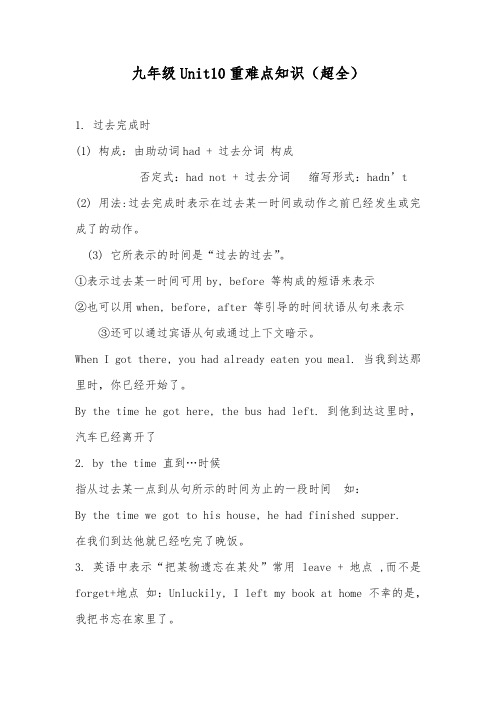
九年级Unit10重难点知识(超全)1. 过去完成时(1) 构成:由助动词had + 过去分词构成否定式:had not + 过去分词缩写形式:hadn’t (2) 用法:过去完成时表示在过去某一时间或动作之前已经发生或完成了的动作。
(3) 它所表示的时间是“过去的过去”。
①表示过去某一时间可用by, before 等构成的短语来表示②也可以用when, before, after 等引导的时间状语从句来表示③还可以通过宾语从句或通过上下文暗示。
When I got there, you had already eaten you meal. 当我到达那里时,你已经开始了。
By the time he got here, the bus had left. 到他到达这里时,汽车已经离开了2. by the time 直到…时候指从过去某一点到从句所示的时间为止的一段时间如:By the time we got to his house, he had finished supper.在我们到达他就已经吃完了晚饭。
3. 英语中表示“把某物遗忘在某处”常用 leave + 地点 ,而不是forget+地点如:Unluckily, I left my book at home不幸的是,我把书忘在家里了。
4. close v. 关 adv. 接近地靠近地 closed adj. 关的5. come out 出来6. on time 按时准时既不早也不迟 in time 及时指在时限到来之前7. luckily adv. 幸运地 lucky adj. 幸运的 luck n. 好运8. give sb. a ride 让某搭便车如:He often gives me a ride to school. 他经常让我搭便车去学校。
9.only just 刚刚好、恰好10. go off (闹钟)闹响 The alarm went off just now. 刚才警钟响了。
Unit10 sectionB 知识点讲解
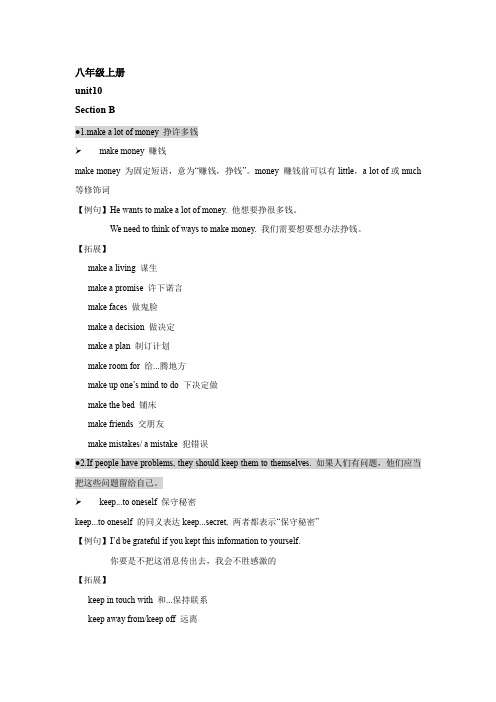
八年级上册unit10Section B●1.make a lot of money 挣许多钱➢make money 赚钱make money 为固定短语,意为“赚钱,挣钱”。
money 赚钱前可以有little,a lot of或much 等修饰词【例句】He wants to make a lot of money. 他想要挣很多钱。
We need to think of ways to make money. 我们需要想要想办法挣钱。
【拓展】make a living 谋生make a promise 许下诺言make faces 做鬼脸make a decision 做决定make a plan 制订计划make room for 给...腾地方make up one’s mind to do 下决定做make the bed 铺床make friends 交朋友make mistakes/ a mistake 犯错误●2.If people have problems, they should keep them to themselves. 如果人们有问题,他们应当把这些问题留给自己。
➢keep...to oneself 保守秘密keep...to oneself 的同义表达keep...secret, 两者都表示“保守秘密”【例句】I’d be grateful if you kept this information to yourself.你要是不把这消息传出去,我会不胜感激的【拓展】keep in touch with 和...保持联系keep away from/keep off 远离keep the record 保持记录keep one’s promise 遵守诺言keep a secret 保守秘密●3.Sometimes they have problems with their schoolwork,... 有时他们有功课方面的问题,...➢have problems with 在...方面有困难have problems with 表示“在...方面有困难”,相当于have problems (in) doing...,类似的表达还有have trouble/difficulty with.../(in) dong...【例句】They have problems with reading and writing. 他们在阅读和写作方面有困难。
九年级英语Unit10 重点、难点、考点及疑点注释
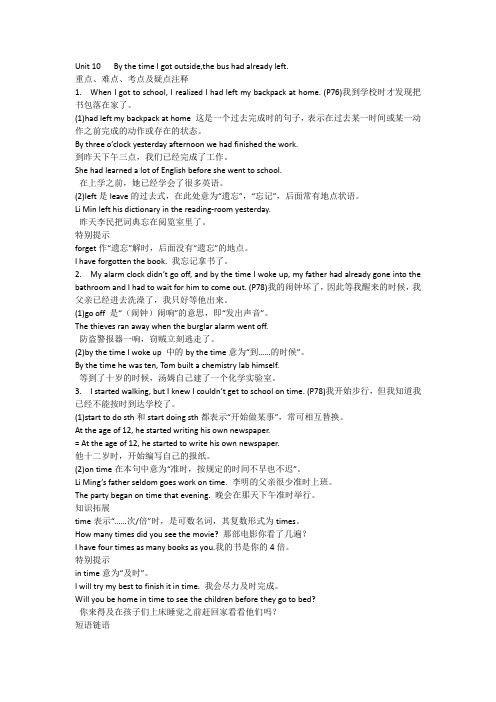
Unit 10 By the time I got outside,the bus had already left.重点、难点、考点及疑点注释1. When I got to school, I realized I had left my backpack at home. (P76)我到学校时才发现把书包落在家了。
(1)had left my backpack at home 这是一个过去完成时的句子,表示在过去某一时间或某一动作之前完成的动作或存在的状态。
By three o’cloc k yesterday afternoon we had finished the work.到昨天下午三点,我们已经完成了工作。
She had learned a lot of English before she went to school.在上学之前,她已经学会了很多英语。
(2)left是leave的过去式,在此处意为“遗忘”,“忘记”,后面常有地点状语。
Li Min left his dictionary in the reading-room yesterday.昨天李民把词典忘在阅览室里了。
特别提示forget作“遗忘”解时,后面没有“遗忘”的地点。
I have forgotten the book. 我忘记拿书了。
2. My alarm clock didn’t go off, and by the time I woke up, my father had already gone into the bathroom and I had to wait for him to come out. (P78)我的闹钟坏了,因此等我醒来的时候,我父亲已经进去洗澡了,我只好等他出来。
(1)go off 是“(闹钟)闹响”的意思,即“发出声音”。
The thieves ran away when the burglar alarm went off.防盗警报器一响,窃贼立刻逃走了。
Unit 10 知识梳理
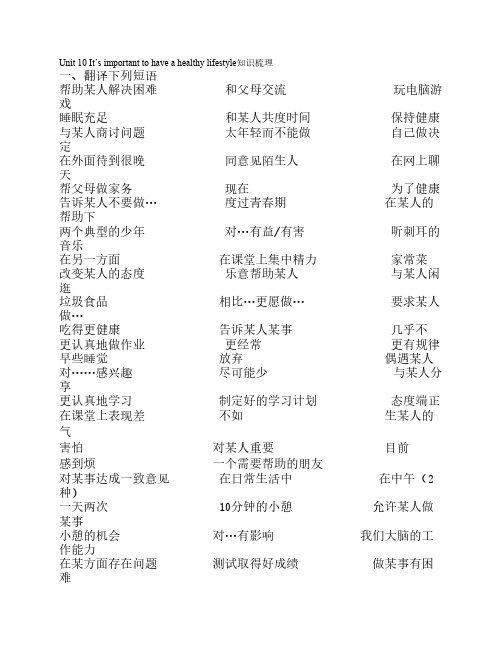
Unit 10 It’s important to have a healthy lifestyle知识梳理一、翻译下列短语帮助某人解决困难 和父母交流 玩电脑游戏睡眠充足 和某人共度时间 保持健康与某人商讨问题 太年轻而不能做 自己做决定在外面待到很晚 同意见陌生人 在网上聊天帮父母做家务 现在 为了健康告诉某人不要做… 度过青春期 在某人的帮助下两个典型的少年 对…有益/有害 听刺耳的音乐在另一方面 在课堂上集中精力 家常菜改变某人的态度 乐意帮助某人 与某人闲逛垃圾食品 相比…更愿做… 要求某人做…吃得更健康 告诉某人某事 几乎不更认真地做作业 更经常 更有规律早些睡觉 放弃 偶遇某人对……感兴趣 尽可能少 与某人分享更认真地学习 制定好的学习计划 态度端正在课堂上表现差 不如 生某人的气害怕 对某人重要 目前感到烦 一个需要帮助的朋友对某事达成一致意见 在日常生活中 在中午(2种)一天两次 10分钟的小憩 允许某人做某事小憩的机会 对…有影响 我们大脑的工作能力在某方面存在问题 测试取得好成绩 做某事有困难最好不要做… 一直做某事 在固定的时间…的数量 因人而异 不到8小时在白天 大量的研究 为了二、翻译下列句子1. 拥有健康的生活方式是很重要的。
2.我认为对青少年来说与某个人商量问题是很重要的。
3. 锻炼有助于青少年保持健康。
4. 为了健康,青少年需要足够的睡眠。
5. 不过多玩电脑游戏是很重要的。
6. 她太小了,不能自己做决定。
7. 告诉他们不要会见陌生人。
8. 他有一些对自己不太好的习惯。
9. 他们知道要改变坏习惯,什么时候也不算晚。
10. 他们知道,她在学校一直很努力。
11. 我需要找更多时间读书12. 对我来说最重要的事情是吃健康的食品13. 你锻炼越多,你就会变得越健康14. 我已经停止吃垃圾食品了15. 尽量不要吃太多盐或糖16. 尽可能经常地帮助别人摆脱困难17. 要对你的学校生活感兴趣18. 要尽可能少的玩电脑游戏19. 他过去在课堂上表现恶劣20. 我父母想让我吃得更健康21. 我认为他们不如你了解我22. 你能告诉我怎么办么?23. 显然在日常生活中,我们的睡眠越少,我们在日常生活中的表现越差.24.我们所需要的睡眠时间因人而异.Unit10 知识运用1、根据句意和首字母完成单词1. I think it’s important to talk problems o_____ with someone.2. He can’t make a d______ to go to the concert.3. Teenagers should get e_______ sleep every day.4. For middle school students, we should have good h_____.5. Tell the children not to talk with s_______.6. Du Fei and Wang Le are two t______ teenagers.7. Jim doesn’t pay a________ in class, so he is bad at lessons.8. You ’ re so tired .You must get e______ sleep.9. We must have a good a_________ to our study.10. Oh, my god! I didn’t get t _______ the exam.11. The boy is s_________ ill. We must take him to hospital at once.12. Mr. Black told his students not to c________ on the Internet.13. He often h_____ out with friends at weekends, so he can’t finish his homework on time.14. The two friends s________ everything— they had no secrets.15. If you go without sleep, you might have p_____ with your memory.二、用所给词的适当形式填空1. It’s very important _________(change) your attitude.2. My father told me _________(not ,stay) out late.3. In order to be _______(health), teenagers should exercise often.4. We need _______(take )a taxi to go to the train station.5. He got up too late _______(catch) the bus .6.They must play computer games as l________(little) as p________.7. I don’t think they understand me as _______(good)as you can.8 .My parents want me _________(eat) more _______(health)9. I’ m afraid they might ________(be) angry with ______(I) if I talk to______( they)10. My parents don't let _____(I)______(go) out with my friends.三、单项选择1. ---Lucy, could you help me ____the map on the blackboard? We won’t need it. ---With pleasure.A. put downB. put upC. put onD. put away2. You ____be careful with fire when you have a picnic in the forest. It’s too dangerous.A. willB. mustC. canD. may3. ---Our teacher wouldn’t give us the answers to the questions directly.---Why not work them out all by _____?A. themselvesB. himselfC. ourselvesD. myself4. Although I failed four times, my father encouraged me to have a____try.A. secondB. thirdC. fourthD. fifth5. —Sam, our daughter has grown up. Should we do everything forher? —Oh, dear. Let her _________ her own life.A. behaveB. shareC. organizeD. do6. Whatever we do, first, we need to have a right ___ towardseverything. A. ability B. attitude C. memory D. concentrate7. Scientists can’t _________ on why we need to sleepA. dependB. explainC. guideD. agree8. —You look so sleepy. I think you shouldn’t t often stay up.—Yes, I find the less I sleep, _______ I do in the work during the day.A. the moreB. the betterC. the fewerD. the worse9. —Let’s go to the KFC, OK?—We’d better eat junk food _________ possible. It’s not healthy.A. as little asB. as much asC. as often asD. as well as10. Though it’s difficult for me to learn English well, I won‟t _________ because it’s very important.A. give it outB. give up itC. give it upD. give it away11. —Miss Li, I have trouble with my English. What can I do?—Study harder from now on. It’s never ____ late ___ catch up with your classmates.A. too; toB. so; thatC. as; asD. such; that12. David used to prefer junk food._________, with the help of his parents, he eats less such food now.A. ButB. HoweverC. SoD. Or13. —Hi, Would you like to ____ with me in the shopping center?—Certainly, I’d like to.A. help outB. get throughC. hang outD. give out14. —We often talk with each other on QQ.—Really? Will you please show me _________ it?A. what to useB. how to useC. what I can useD. how can I use15. —I think teenagers can go out at night.—_________ . It’s not safe enough.A. I agreeB. I think soC. I don’t knowD. I disagree。
Unit10重要知识点讲解2021-2022学年人教版九年级英语
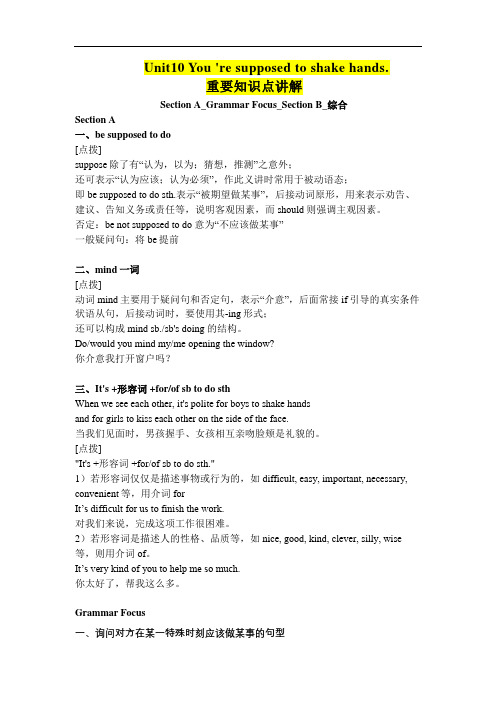
Unit10 You 're supposed to shake hands.重要知识点讲解Section A_Grammar Focus_Section B_综合Section A一、be supposed to do[点拨]suppose除了有“认为,以为;猜想,推测”之意外;还可表示“认为应该;认为必须”,作此义讲时常用于被动语态;即be supposed to do sth.表示“被期望做某事”,后接动词原形,用来表示劝告、建议、告知义务或责任等,说明客观因素,而should则强调主观因素。
否定:be not supposed to do 意为“不应该做某事”一般疑问句:将be提前二、mind一词[点拨]动词mind主要用于疑问句和否定句,表示“介意”,后面常接if引导的真实条件状语从句,后接动词时,要使用其-ing形式;还可以构成mind sb./sb's doing 的结构。
Do/would you mind my/me opening the window?你介意我打开窗户吗?三、It's +形容词 +for/of sb to do sthWhen we see each other, it's polite for boys to shake handsand for girls to kiss each other on the side of the face.当我们见面时,男孩握手、女孩相互亲吻脸颊是礼貌的。
[点拨]"It's +形容词 +for/of sb to do sth."1)若形容词仅仅是描述事物或行为的,如difficult, easy, important, necessary, convenient等,用介词forIt’s difficult for us to finish the work.对我们来说,完成这项工作很困难。
- 1、下载文档前请自行甄别文档内容的完整性,平台不提供额外的编辑、内容补充、找答案等附加服务。
- 2、"仅部分预览"的文档,不可在线预览部分如存在完整性等问题,可反馈申请退款(可完整预览的文档不适用该条件!)。
- 3、如文档侵犯您的权益,请联系客服反馈,我们会尽快为您处理(人工客服工作时间:9:00-18:30)。
知识点讲解:
P63 ,3a:
1, or (1) “或者”,连词,用来连接并列的单词或词组,表示选择关系。
Is he your brother or your friend?
(2) 在否定句和疑问句中替换and.
2, then 然后,He speaks English, and then he plays the piano.
3, be in 相当于join, 加入到…中, 成为…中的一员
I want to be in the school trip.
Tom is in the swimming club.
4, call sb. at …
P63, 4
1, show 1) 名词,演出,表演。
school show 学校公演
be on show …在展览中The photos are on show.
2)动词,给…看,出示show sb. sth. = show sth. to sb.
Please show me your watch. = Please show your watch to me.
2, do Chinese kung fu 表演中国功夫
3, Sunday 星期天,是一周的第一天,在星期天on Sunday;
这个星期天this Sunday (之前不加on)
4, pm\p.m. 指下午;am\a.m. 指上午,均放在具体时间之后。
P64, 3
1, May I know your name? 你叫什么名字?(语气更委婉,更有礼貌)
= May I have your name? = What’s your name?
may 情态动词,可以。
You may go now.
2, draw 动词,画画。
draw a cat
3, a little (1) 修饰动词,“一点”,放在动词之后,做状语。
反义短语a lot.
I know a little/a lot about the boy.
(2) 修饰不可数名词,“一些”,放在不可数名词之前。
a little ice cream 一些冰激凌
4, e-mail = email 可数名词,an e-mail/e-mails
5, address 可数名词,an address/addresses What’s your address?
6, a lot修饰动词,“大量”,放在动词之后,做状语。
反义短语a little
Thanks a lot. Learn a lot about Chinese history.
7, why 为什么,是特殊疑问词,提问原因(because…)。
和其他特殊疑问词一样,Why 后面必须跟一般疑问句。
Why do you want to join the swimming club?
Why is he good at English?。
